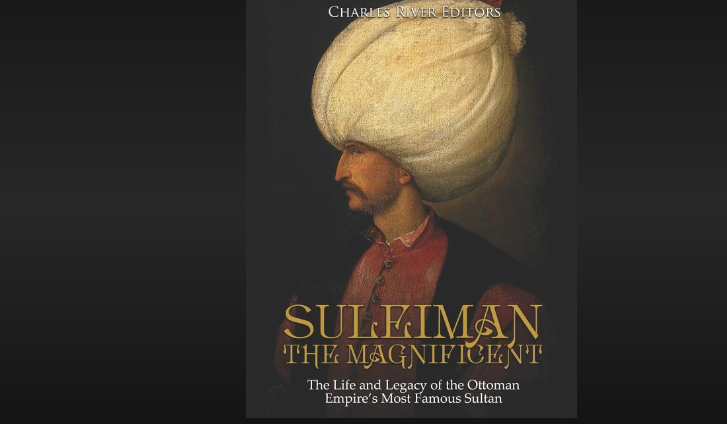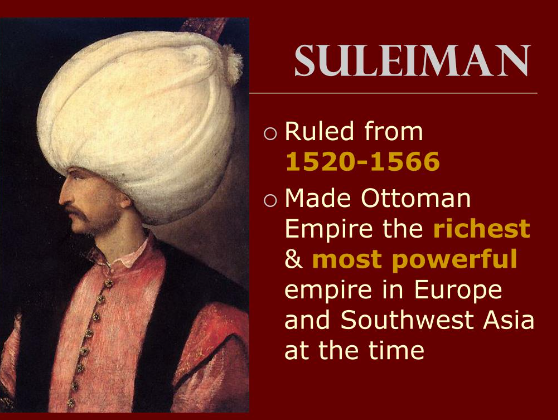Unveiling the Magnificence of Sultan Suleiman I: Exploring the Reasons Behind His Illustrious Title
Throughout history, certain individuals have earned titles that encapsulate their extraordinary accomplishments and lasting impact. One such figure is Sultan Suleiman I, who was bestowed with the prestigious epithet "Suleiman the Magnificent." In this article, we will delve into the life and reign of Sultan Suleiman I of the Ottoman Empire, exploring the factors that led to his illustrious title and his enduring legacy.

Suleiman the magnicent
1. Introduction to Sultan Suleiman I
a. Sultan Suleiman I: Sultan Suleiman I, also known as Suleiman the Magnificent, ruled the Ottoman Empire from 1520 to 1566. He was the tenth Sultan of the empire and is widely regarded as one of its most influential and powerful leaders.
b. Ottoman Empire: The Ottoman Empire, spanning three continents, was a vast and formidable empire during Suleiman's reign. Its territories included present-day Turkey, parts of Europe, the Middle East, and North Africa.
2. Military Victories and Expansion
a. Expansion of the Empire: Sultan Suleiman I oversaw a period of significant territorial expansion for the Ottoman Empire. His military campaigns led to the acquisition of key regions, including parts of Hungary, Greece, Iraq, and Egypt, among others.
b. Siege of Belgrade: One of Suleiman's notable military victories was the capture of Belgrade in 1521. This strategic stronghold provided the Ottomans with greater control over the Danube River and facilitated further expansion into Central Europe.
c. Conquest of Rhodes and Malta: Sultan Suleiman I's successful campaigns included the capture of the island of Rhodes in 1522 and the Siege of Malta in 1565. These conquests demonstrated the Ottoman Empire's naval prowess and solidified its dominance in the Mediterranean.
3. Legal and Administrative Reforms
a. Legal Codification: Sultan Suleiman I implemented comprehensive legal reforms, most notably through the development of the Kanunnames, a collection of laws that standardized and clarified various aspects of Ottoman law. These reforms enhanced the empire's judicial system and promoted justice and stability.
b. Administrative Structure: Suleiman introduced administrative reforms that improved the efficiency and governance of the Ottoman Empire. He established various departments, known as Divans, which specialized in different aspects of governance, including finance, justice, and military affairs.
4. Architectural and Cultural Achievements
a. Architectural Patronage: Sultan Suleiman I was a notable patron of architecture, commissioning magnificent structures that showcased the empire's wealth and grandeur. The most renowned example is the Süleymaniye Mosque in Istanbul, a masterpiece of Ottoman architecture.
b. Art and Literature: Suleiman's reign witnessed a flourishing of arts and literature. He supported renowned poets, scholars, and calligraphers, fostering a vibrant cultural environment that left a lasting impact on Ottoman society.
5. Diplomacy and International Relations
a. Diplomatic Alliances: Sultan Suleiman I skillfully managed diplomatic relations with neighboring powers, forging strategic alliances and treaties. Notably, he formed an alliance with King Francis I of France, which solidified Ottoman-French relations and enabled mutual support against common adversaries.
b. Cultural Exchange: Suleiman's court was renowned for its cosmopolitan atmosphere, attracting scholars, artists, and diplomats from around the world. This cultural exchange promoted a deeper understanding of diverse perspectives and contributed to the empire's reputation as a center of intellectual and artistic brilliance.
6. Legacy and the Title "Suleiman the Magnificent"
a. Cultural Impact: Sultan Suleiman I's reign had a profound and lasting impact on the Ottoman Empire andbeyond. His military victories, administrative reforms, architectural patronage, and cultural achievements transformed the empire into a dominant force in the region.
b. International Reputation: Sultan Suleiman I's reputation as a powerful and influential leader extended far beyond the borders of the Ottoman Empire. His military successes and diplomatic skills earned him respect and admiration among his contemporaries and European monarchs.
c. The Magnificence of Suleiman: The title "Suleiman the Magnificent" captures the grandeur and splendor associated with his reign. It reflects his exceptional leadership qualities, his significant contributions to the empire's expansion, his patronage of the arts, and his enduring legacy.
d. Enduring Popularity: Even centuries after his reign, Sultan Suleiman I continues to capture the imagination of people worldwide. His portrayal in literature, film, and popular culture further enhances his legendary status and keeps his memory alive.

Suleiman
Sultan Suleiman I, known as "Suleiman the Magnificent," left an indelible mark on the Ottoman Empire and the world. His military triumphs, legal reforms, architectural patronage, and cultural achievements shaped the empire's destiny and contributed to its prominence.
The title "Suleiman the Magnificent" aptly encapsulates his extraordinary reign and the enduring legacy he left behind. Through his visionary leadership, military prowess, cultural patronage, and diplomatic acumen, Sultan Suleiman I secured his place in history as one of the most remarkable and influential rulers of the Ottoman Empire.